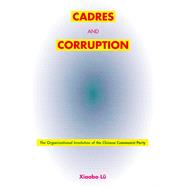Cadres and Corruption : The Organizational Involution of the Chinese Communist Party
, by Lu, Xiaobo- ISBN: 9780804744300 | 0804744300
- Cover: Paperback
- Copyright: 7/1/2000
The most up-to-date and comprehensive analysis of corruption and change in the Chinese Communist Party,Cadres and Corruptionreveals the long history of the party's inability to maintain a corps of committed and disciplined cadres. Contrary to popular understanding of China's pervasive corruption as an administrative or ethical problem, the author argues that corruption is a reflection of political developments and the manner in which the regime has evolved. Based on a wide range of previously unpublished documentary material and extensive interviews conducted by the author, the book adopts a new approach to studying political corruption by focusing on organizational change within the ruling party. In so doing, it offers a fresh perspective on the causes and changing patterns of official corruption in China and on the nature of the Chinese Communist regime. By inquiring into the developmental trajectory of the party's organization and its cadres since it came to power in 1949, the author argues that corruption among Communist cadres is not a phenomenon of the post-Mao reform period, nor is it caused by purely economic incentives in the emerging marketplace. Rather, it is the result of a long process of what he calls organizational involution that began as the Communist party-state embarked on the path of Maoist "continuous revolution." In this process, the Chinese Communist Party gradually lost its ability to sustain officialdom with either the Leninist-cadre or the Weberian-bureaucratic mode of integration. Instead, the party unintentionally created a neotraditional ethos, mode of operation, and set of authority relations among its cadres that have fostered official corruption.






